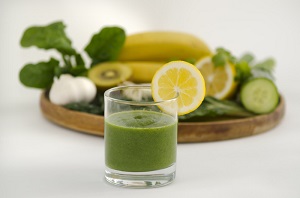 When foods are eaten and digested, they produce either an acidifying or alkalizing effect within the body. When more alkaline foods are consumed, the body can become slightly alkaline instead of acid. Ideally, the blood pH level should be between 7.35 and 7.45. Foods such as citrus fruits, soy products, raw fruits and vegetables, wild rice, almonds, and natural sweeteners (i.e. Stevia) are all good alkaline food choices.
When foods are eaten and digested, they produce either an acidifying or alkalizing effect within the body. When more alkaline foods are consumed, the body can become slightly alkaline instead of acid. Ideally, the blood pH level should be between 7.35 and 7.45. Foods such as citrus fruits, soy products, raw fruits and vegetables, wild rice, almonds, and natural sweeteners (i.e. Stevia) are all good alkaline food choices.
It is believed that there are many benefits to shifting your eating patterns from acid to alkaline. When the body is kept slightly alkaline, it is less susceptible to disease. It is easier to lose weight or maintain a healthy weight level on an alkaline diet. Most people experience an increase in their energy level, as well as a lessening of anxiety and irritability once they begin eating more alkaline foods. Mucous production is decreased and nasal congestion is reduced, making it easier to breath. Allergies are frequently alleviated as a result of an alkaline diet. The body is also less susceptible to illnesses such as cancer and diabetes. Most of the people surveyed found they just feel better, when an increased sense of health and well-being, once they make a conscious effort to adhere to an alkaline diet.
Alkaline diets require one to follow a lifestyle completely opposite to the high protein low carb diets. The high protein diets may leave a person fatigued and tired and likely the weight will return as soon as the diet stops. With alkaline diets, this is not the case. The diets can be incorporated into a person’s way of life and within days the results start to show. An alkaline diet requires you to eat about 80% alkalizing foods so as to maintain the alkaline pH of the body to 7.4. High protein diets tend to make the pH of the body acidic as opposed to its natural alkaline tilt. It is thought that when the body pH becomes acidic it can attract illnesses and deplete your energy. An acidic pH also results in rapid degeneration of the cells in the human body. An alkaline state allows various body functions to be carried out smoothly and the immune system of the body stays strong. This type of diet is good for those people suffering from chronic diseases like arthritis, migraines, sinusitis and osteoporosis.
Alkaline diets constitute mostly of fruits and vegetables. Consuming a diet of approximately 70-80% of green vegetables and sweet fruits is the key to an alkaline diet. Lemons, melons, almonds, honey, olive oil are also high on the list of top alkaline foods. Meats and fats should be avoided. All foods that are acidifying like coffee, alcohol, meats and even certain vegetables like cooked spinach should not form more than 20% of your diet.
Try these alkaline rich foods:
- Broccoli
- Brussels sprouts
- Cabbage
- Cauliflower
- Turnips
- Collard greens
- Kale
- Kohlrabi
- Bok Choi
- Avocado
- Tomato
- Red Beets
- Carrots
- Lima Beans
- Radish
- Rutabaga
- Egg Plant
- Asparagus
- Artichoke
- Lettuce
- Cucumber
- Celery
- Peppers
- Zucchini
- Squash
- Spinach
- Peas
- Parsnips
- Onions
- Unripe bananas
- Sour cherries
- Fresh Coconut
- Figs
- Fresh Lemon and Lime
In order for an alkaline diet to work, you must condition yourself to adhere to the diet program. Like anything, you want to avoid unhealthy food and drinks. Make a list of alkaline foods versus acid foods and eat the 80% – 20% rule. Since an alkaline diet means avoiding alcohol and any other foods with high acidity, it also means that you will decrease the risk of developing diseases associated with unhealthy diet like diabetes, hypertension and obesity. Talk to your trainer to help you develop the best diet for you!
For more articles go to http://clubonefitness.lifestyleezine.com

